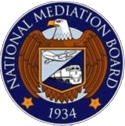WASHINGTON — Although 16 Republicans refused to be cowed by their conservative leadership, the House of Representatives last week succeeded in another attack on collective bargaining by voting to nullify a National Mediation Board ruling making representation elections for airline and railroad workers more democratic.
All Democrats in the House stood with the NMB and labor, and 16 Republicans crossed over to do the same; but it was not enough given the Republican majority.
The House action, nullifying the NMB ruling in favor of more democratic representation elections, is contained in a Federal Aviation Administration authorizing bill.
The 220-206 vote to nullify the NMB ruling through legislation is not the end. The anti-union provision does not appear in a companion bill previously passed by the Senate, which means a House-Senate conference committee will have an opportunity to remove the anti-union provision from the bill before it goes back to the two chambers for a final vote.
President Obama said he will veto the FAA authorization bill if the anti-labor provision appears in the final bill.
The provision in the bill, inserted at the request of airlines, is to overturn an NMB ruling last year that scrapped the undemocratic means by which airline and railroad representation votes, under the Railway Labor Act, are counted.
Prior to the NMB ruling, those not voting in representation elections were considered to have cast a “no” vote for representation. The NMB changed the rule to provide that a simple majority of those actually voting determine the outcome of representation elections.
Were Congress to succeed in overturning the new NMB representation election rule, the NMB procedure would be counter to all other elections.
Neither elections for Congress, the White House or even the PTA count as “no” votes those not voting. In fact, as documented by the Communications Workers of America, had the Republican-desired provision been in effect for 2010 congressional elections, not a single member of Congress would have been elected.
Rep. Steven LaTourette (R-Ohio) and Rep. Jerry Costello (D-Ill.) introduced an amendment to remove the anti-union provision from the FAA reauthorization bill, and it was that amendment that was defeated by the 220-206 vote. The FAA reauthorization bill then passed the House by a 223-196 vote.
In threatening a veto of the FAA reauthorization bill if the anti-union provision remains, President Obama said the provision “would undermine a fundamental principle of fairness in union representation elections — that outcomes should be determined by a majority of the valid ballots cast.”
Earlier, airlines were turned back by a federal court in an effort to invalidate the NMB ruling, with the court giving deference to the experts at the NMB.
Republican members of the House, who refused to cast an anti-labor vote and joined with House Democrats were:
Mario Diaz-Balart (Fla.)
Jo Ann Emerson (Mo.)
Chris Gibson (N.Y.)
Michael Grimm (N.Y.)
Timothy Johnson (Ill.)
Walter Jones (N.C.)
Peter King (N.Y.)
Steven LaTourette (Ohio)
Frank LoBiondo (N.J.)
Todd Platts (Pa.)
Dave Reichert (Wash.)
David Rivera (Fla.)
Ileana Ros-Lehtinen (Fla.)
Jon Runyan (N.J)
Christopher Smith (N.J.)
Don Young (Alaska)
 The National Mediation Board yesterday released from further mediation every commuter union on New Jersey Transit (NJT).
The National Mediation Board yesterday released from further mediation every commuter union on New Jersey Transit (NJT). 